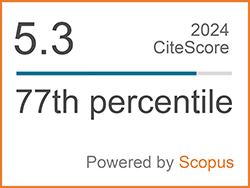Surface Modification and Thermal Bonding in COC Polymeric Microfluidic Chip
Abstract
The field of polymer microfluidics, more broadly termed as ‘Lab on a Chip’ (LOC), is an interdisciplinary effort that combines aspects of physics, chemistry, nanotechnology and biotechnology. Cyclic olefin copolymers (COC) are the most widely used polymers for the fabrication of microfluidic devices due to its excellent transparency, low dielectric loss, low moisture absorption, good chemical resistance and the availability of a variety of grades with different glass transition temperature. Bioadhesion on polymer microchannel surfaces can happen during the separation process due to hydrophobic character of the COC surface. Accumulation of the adhered biomolecules can lead to coagulation, resulting in obstruction in the flow of the liquids through the micro channels thus causing system failure due to channel blockage. Moreover, thermal bonding and surface modification are two major issues in research to enhance the efficiency and performance of bioMEMS. In this study we explore the surface modification process and its influence on the interface bond strength in COC microfluidic chips. Surface modification of COC microchannels was carried out by UV-photografting of hydrophilic monomer and the results were characterized using contact angle and FTIR. The tensile bond strength test results showed significantly increased bond strength values in the modified chips. Moreover, the UV-photografted samples showed excellent hemocompatibility as it inhibits the blood cell adhesion and aggregation
Keywords
Refbacks
- There are currently no refbacks.
 Applied Science and Engineering Progress
Applied Science and Engineering Progress







